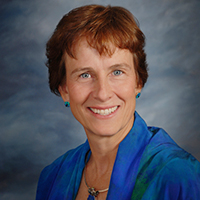
Director, George Washington Institute for Spirituality and Health
Professor, Dept. of Medicine and Health Sciences
George Washington University School of Medicine Professor, Health Leadership and Management George Washington University School of Public Health
Christina Puchalski, MD, MS, is a pioneer and international leader in the movement to integrate spirituality into healthcare in both the clinical setting and in medical education. As founder and director of the George Washington Institute for Spirituality and Health (GWish) at The George Washington University in Washington, DC, she continues to break new ground in the understanding and integration of spiritual care in a broad spectrum of healthcare environments. The spiritual assessment tool called FICA, which she developed, is used widely in clinical settings around the world. Medical education has been impacted in this country by a GWish-run awards program their curriculum.
Puchalski is a professor of Medicine and Health Sciences at The George Washington University School of Medicine. She is an active board-certified clinician in Internal Medicine and Palliative Care. She has received numerous awards including the George Washington University Distinguished Alumni Award in recognition of her scholarship and leadership. She is a fellow of the American College of Physicians and a member of Alpha Omega Alpha Honor Medical Society.
Dr. Puchalski is widely published in journals with work ranging from biochemistry research to issues in ethics, culture, and spirituality and healthcare. She has authored numerous book chapters and published a book with Oxford University Press entitled Time for Listening and Caring: Spirituality and the Care of the Seriously Ill and Dying. She published Making Health Care Whole through Templeton Press. Most recently, she is co-editor of an international textbook on spirituality and health published by Oxford University Press..
Puchalski is first and foremost a clinician. The cornerstone of her practice in internal medicine, geriatrics, and palliative care is integrating patients’ spiritual beliefs into their care, addressing sensitive medical issues facing seriously ill patients, and supporting healthcare professionals in their provision of compassionate care. Puchalski's work in the field of spirituality and medicine encompasses the clinical, the academic, and the pastoral application of her research and insights.
Spirituality in the Cancer Care
Abstract
Spirituality, defined as a way people find meaning and purpose and how they experience their connectedness to self, others, the significant or sacredi, is an integral dimension of human beings and has been recognized as a critical factor in the health and being of patients particularly those with cancer. Numerous studies have demonstrated a relationship between spirituality and a variety of patient outcomes including quality of life, and coping with illness. From the initial diagnosis, through treatment, survivorship, recurrence and dying, cancer patients’ understanding of their illness and their lives with their illness range from the physical, social, emotional and spiritual. A diagnosis raises spirituality-related questions and concerns, both existential and religious. Diagnosis of cancer often triggering deep questions of meaning and purpose, and with the journey in treatment, deep issues of hope and fulfillment. Spirituality is also an important component of quality of life of patients with cancer. Quality of life for patients with cancer includes spiritual wellbeing as well as well and the physical and psycho-social wellbeing.ii
For many years, a diagnosis of cancer signaled a short life span, but scientific advances have resulted in longer life for patients with cancer, many of whom are now considered survivors which means many will live with the disease or with the sequelae of treatment for a long time.iii Thus, in the clinics today the issues are not just about planning for an imminent death, but rather about living well with the disease through the trajectory of their cancer.
The National Comprehensive Cancer Network (NCCN) identifies spiritual distress that may extend along the continuum of care. ivAttending to psychosocial-spiritual needs as well as physical needs of cancer patients across the continuum of care is well documented, both from the perspective of patient desire and the benefits to quality of life of patients. Models of Interprofessional Spiritual Care have been developed with trained chaplains as an integral part of this care. Working with Board Certified Chaplains as the expert spiritual care professionals is essential to attending to patient spiritual issues. But every member of the healthcare team must be responsible for attending to all dimensions of a patients’ suffering: the spiritual as well as the psychosocial and physical suffering. It is therefore critical that clinicians address spiritual issues of patient, diagnose and treat spiritual distress and integrate patient spiritual resources of strength into the patient treatment plan.
- i Puchalski CM, Ferrell B, Virani R, et a.(2009). Improving the quality of spiritual care as a dimension of palliative care:
The report of the consensus conference. J Palliat Med,12(10), 885-904 - ii Cohen SR, Mount BM, Tomas JJ, Mount LF (1996). Existential well-being is an important determinant of quality of life: Evidence from the McGill quality of life questionnaire. Cancer, 77:576-586
- iii Ferrell BR, Hassey-Dow K, Leigh S, Ly J, Gulasekaram P (1995). Quality of life in long-term cancer survivors. Oncology Nursing Forum, 22(6):915-922
- iv Jacobsen PB, Ransom S (2007). Implementation of NCCN distress management guidelines by member institutions. Journal of the National Comprehensive Cancer Network, 5(1):93-103
